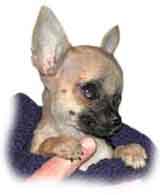Small Dog BreedsInformation About The West Highland White Terrier Dog Breed |
|
|
The West Highland White Terrier is an adorable, hardy small dog that is relatively easy to train. This breed has gained an enormous popularity over the recent years due to its attractive overall appearance, particularly his coat which is one of the breed's most striking features. His cute and handy size, along with his superb sporting instinct makes him suitable for town or country living. He gets along very well with children as well as other dogs which makes him a wonderful family dog. Size: The average size for a healthy adult West Highland White Terrier is about 11in. There is no particular weight standard for this breed in the United States or the United Kingdom. History and origin: The first West Highland White Terrier clubs were formed in 1905. This is also the same year when breeds like the Skye Terrier and Cairn Terrier that were in the past was classified as Small Highland Working Terriers gained their own individual status. However, it appears that in the late 1800's, there lived a white Scottish Terrier names Scottie, a strain that was bred by Colonel Malcolm of Poltalloch where the name Poltalloch Terrier was derived; they were also referred to as Roseneath Terriers. Feeding: Recommended feeding for the West Highland White Terrier is about 1-11/2 cans of quality meat product with added biscuit in the same amount by volume or 3 cupfuls of high-quality dry food. He would love an occasional marrow or chop bone; this dog loves to dig, usually to recover a long-discarded much-enjoyed bone. Exercise: He can easily get used to town or country living and be satisfied either indoors or in a kennel. However, he will be happiest as an indoor pet that is allowed to run around inside the house and gets enough chance to be taken out for a walk. Keep in mind that this breed was originally used as a working dog with the job to hunt badger and fox. He is also a good ratter and enjoys a lively game of ball. Grooming: The West Highland White Terrier is a great choice for a family who wants an active and healthy dog. But if you have a busy lifestyle and do not have the time to spend on regular grooming, perhaps you should think twice about getting this breed. His coat needs to be brushed and combed everyday. In addition, he needs his coat trimmed twice a year, particularly in the neckline. Straggly hairs need to be removed from ears and tail. Ideally, his coat should be more or less 2in long with the neck and throat hair shorter.Back to the Small Dog Breed page
| |
|
Related News About Dogs ' ); // get rid of newsfeed display by carp CarpConf('poweredby',''); CarpCacheShow('http://www.small-dog-info.com/support-files/rss.xml'); ?>
|
|
|
|
|
|
Copyright © 2006-2007 dogguidance.com |


